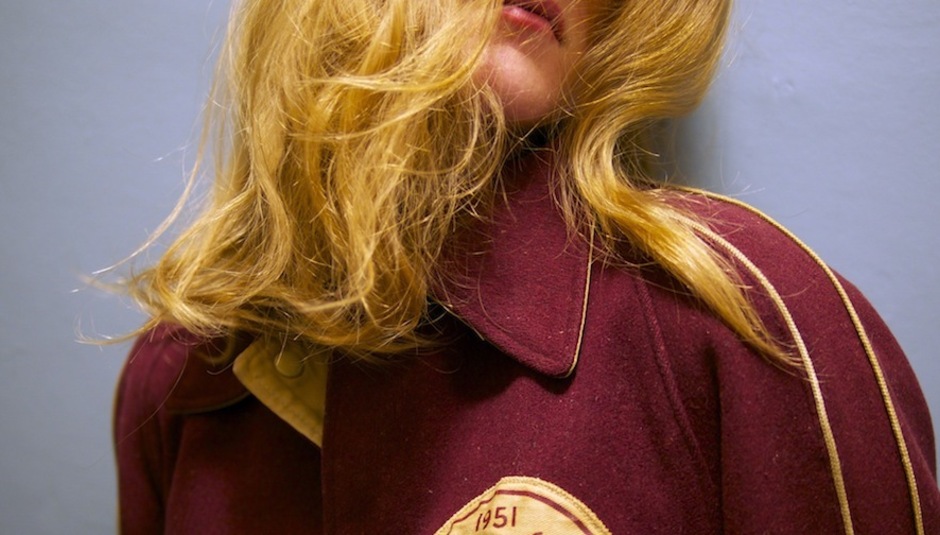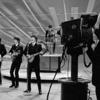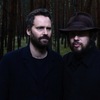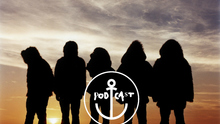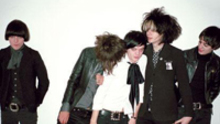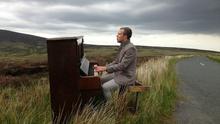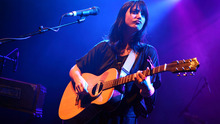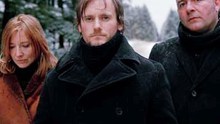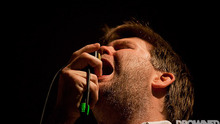Dark, swirling, moody. There are many adjectives that could be used to describe Karen Gwyer’s intensely layered electro, but as she herself tells me, “it’s all about a feeling for me, not words.” To get lost in her two EP’s and stunning debut album Needs Continuum, all on No Pain In Pop, is to immerse yourself in an off-kilter, disquieting world that blends futuristic techno with soft, organic soundscapes; it’s digital, but with a distinctly human touch, an antidote to the harsher end of fashionable electronic music.
So it’s no surprise that she was chosen to play this year’s upcoming Semibreve Festival in Braga, Portugal, a festival that knows all about the avant-garde and boundary-pushing artists. She’s also embarking on a short European Opal Tapes tour at the end of October which, along with trying to find the time to write new material, has packed out an already hectic schedule. I caught up with her via Skype from her adopted hometown of London to talk about her Semibreve set with Maria Mónica, music critics’ shortcomings, and why you don’t ever want to play to people lying on pillows.
How do you go about creating music, and what's your starting point in terms of inspiration?
There's no one thing, and I don't have one process; it completely depends on what’s happening in my life. For the here and now, I recently switched gear and got this new sequencer – it's called an Octatrack, and it's very cool. The sequencer is really the starting point for when I'm playing live – everything hangs off that, and it’s a domino effect. You make a lot of decisions based on it, and my old sequencer was just god awful, absolute horrible, and so I was working in this way before that was just really convoluted and frustrating, but after I got this new one...I’d been recording some music previously, just before getting it, and I was suddenly like: "Wow! Life could have been this easy all along." So I scrapped everything that I’d done previously, and it just so happens that around the same time I was stressing about loads of family issues, and all this frustration building up needed an outlet. And the Octatrack made everything like: "Hey, this is easy, let's go!" So I sat down, and all this stuff just came out. I wouldn’t say there's any way I could pinpoint inspiration, but it's almost like it was a combo of negative/positive situations – the family crap mixed with my workflow being much easier and more flexible. I just got all that emotion out, and now it's out of the way, I'm preparing for this big Opal Tapes tour that's coming up, and my process for preparing material for that is coming from a completely different angle.
Are you inspired by other artists, and what they do?
A few weeks ago I played this festival at the Wysing Arts Centre, and I saw Helena Hauff – she records and DJs under her own name, as well as in a duo called Black Sights. She's a very, very good DJ and electronic musician, and I'd wanted to see her for so long. I was hoping she'd play a certain style of music, but she really surpassed it; she played this really strange, dark, German, minimalist, proto-industrial stuff, and quite a bit of Swedish electro. It was not to the taste of a lot of people in the audience, but it was so good, and I loved it so much...it was just what I needed, as I’ve been getting burned out by all this outsider house music. So when I get back from France, I'm gonna sit down and make music like that. It'll come out sounding like my own, flouncy, melodic stuff that I keep trying not to do, but it'll be directly inspired by this really dark, slow stuff – I’m gonna make slower music for the first time in a long time.
Lot's of your tracks are very constructed and intensely layered. Do you just go at it and keep adding stuff until you're happy, or you think it's dense enough?
Kind of. I do do that when I record, and I do that in a big flurry. I add tracks and more recording, and then what I end up doing is lumping stuff together in different places when I start work on the actual composition. I'm trying not to have compositions that are just dense throughout, and instead create a more dynamic situation where it’s not just a massive wedding cake of layers all the way through. It's hard; I record a lot of stuff, and it's not easy to dump things out, but I have to. I'd end up with twenty 30-minute tracks if I kept everything in.
But live, which I’m doing a lot of these days, is completely different. I really want there to be a lot of different things happening, and I don’t like playing separate tracks – I like playing one thing that changes and might go off in a different direction for a while before coming back around. But it all comes from one "track" really, that could be 45 or 50 minutes long.
Given how complex all that sounds, how easy is it to play live? Sounds like it's very spontaneous...
It's getting easier! It wasn't easy to start with, because I couldn't transfer the complexity of the stuff I was making into a live situation. I had to come at it from a different direction basically, and I'm glad I did; now it's much more the fun part of what I do. I work on the compositions there, and it's much easier to experiment because you’re in a situation where you're in front of a lot of people, and I improvise hugely; probably about 70% of each set. Because I do that, and never play the same set twice, there's so much more fun to be had, and I can then bring that back into the studio. Before, I was starting from the record, and I’d be so anal about it that I felt I had nowhere to go live, like: "It has to sound like this." And I don't have enough hands to make it sound like that! So now, I have my two hands, and I figure out what they are going to do. The meticulousness, and the layering, is all still there. It’s just a lot freer.
Is it easy to self-edit as a solo artist? Do you ever bounce ideas off anyone and seek some outside opinions when you're composing?
No, I never do that. I never can, because it's all in my head from the beginning anyway, and I know how I want it to sound and what the thing that I’m trying to get at is. I could never, ever explain that to someone else, or ask: "Can you listen to this and imagine it sounding like X?" They wouldn’t know what I was talking about. The few times I tried, it was completely fruitless. While I can appreciate someone's opinion, the opinion is being given on something that I know how it will be, but they can't possibly grasp. So I can listen to what someone says, but then have to go: "OK, thanks, but that's totally not what I’m planning on doing." Talking about stuff, either before or after [recording], is not really my thing.
I read in another interview that you feel "embarrassed" about music criticism, and you'd hate to be a music critic. Does that tie into that feeling, that you're trying to describe something in words that perhaps can't - or shouldn't - be described by words?
I mean, I appreciate that people write about music because they are passionate about it, and writing about music is a way to get that passion out and share stuff that you like with other people. And there's also the element of actually being critical about something, which is like: "OK, fine." Everyone's entitled to their own opinion. But for me, I do find that it comes down to a question of whether you think music critics are actually good or not...like every profession, there are those who are good, and those who are not. It's not a matter of whether I "like" the criticism or not, but you can tell within the first few sentences if someone is actually going to write something interesting, and worth reading. The stuff that is worth reading is, I think, very few and far between, and a lot of the other stuff is just words that don't address anything that’s actually going on. When you're making music, it’s all about a feeling for me, not words, and I find it strange when people write something that’s so not about how the music makes them feel. I'm like: "Don’t write about some kind of weird connection with some other, usually woman, electronic musician." It's generally a bit bullshit, and I do get frustrated – I like reviews that actually talk about how a piece of music makes you feel, and think about, in that moment.
Don't get me wrong, I don’t spend ages stewing over this, but I’ve had this conversation with a number of people – critics included – and the people who don't get what I'm talking about generally write stuff that I think is just...I'd be embarrassed if it was me. For example, I wouldn't talk about the fact that someone has given birth in a review; it's like: "Gimme a break." No-one would ever talk about a man in that way, and it's all just stupid crap that has nothing to do with the music. My child is my child, but he did not make the record, and it has absolutely nothing to do with the process; the music speaks for itself.
You're playing at Semibreve this year. How did that come about?
My booking agent emailed me and said they'd like you to play, and when that happens I usually Google it – I hadn't actually heard of the event before – but they’re doing something really interesting so I said I definitely would. The other people they have lined up look interesting as well, and another cool thing was they proposed straight away having a live collaboration between a video artist and myself; that’s never happened before, and it sounded like a lot of fun. So I agreed.
The collaboration is with Maria Mónica – what can we expect? Or what are you allowed to tell me about it?
It's not really a collaboration actually; we'll just be performing together on the night. I’ve purposefully agreed with Maria that we're not going to share what we are doing, but she's been listening to my stuff – not what I’m going to play though – and I've been watching her videos – but not the things she's going to do – and we're going to let it be completely spontaneous on the night. No pre-planning, no exchange beforehand, because I think that’s the most exciting outcome. So I honestly don't know what it's going to be like!
Have you written something special for the event, or will you be playing older material?
It won't be old stuff, no. I wouldn't say I’m writing something especially just for Semibreve; it's one of the first things in a massive chunk of gigs that I'm playing, so I have a couple of sets that I’ll be doing throughout October and November basically. So it will be new material, yes, but just not exclusively [written] for this festival. That's all I can say really.
That's a very intriguing answer....
Well, it also depends on the atmosphere. I've heard that the space is just incredible.
It is. It's an old, classic theatre – very opulent – and one of the most beautiful places I've ever seen live music. The sound system they had last year was phenomenal too, and it's also a seated auditorium, so no-one can stand. Or dance.
Oh my God! So that means that I potentially, maybe, will have a set exclusively for Semibreve then, because you cannot play a really beat-based set to a room of people who are not allowed to stand – it just bombs. In that case, I’ll do something completely different! Which is good.
I don't want to think I've influenced this in a bad way.
No! I just basically haven't had the time to look at the space on Google images yet and see what it's like, but I generally try to do that – it makes all the difference as to what I’m going to play. I hate, and the absolute worse thing, is getting it wrong. I was in Denmark recently doing this Opal Tapes showcase at a festival recently, so I thought: "OK, it's festival, I'm quite up for playing some proper dance music." But when I got there, everyone was lying down, on the floor, on pillows! I freaked out, and it was awful; I got through my set, but there was absolutely no vibe in that room. People were so strung out, and exhausted, or on comedowns...some said it was really great, but it really didn't work for me. So it's good to know they'll be sitting!
I'm really excited to see it now, knowing that it'll be totally off the cuff.
Well, I told Maria that I usually start out slow; there’s a lot of build up, and then it gets quite dense. And that it'll go in a certain direction, with a lot of noise, but then I also tend to do a lot of melodic stuff as well, so there'll be that. There'll be some beat-based stuff, but just not dance style, you know? Maybe this is a really good place to start out with my new slow vibe! It's always awkward when people aren’t standing up, and there are chairs, because when you have a really fast beat going, the expectation is that somebody will get up. But it’s like a herd of sheep; if nobody does it, everyone's just lying around on the floor or whatever. Different countries have different boldness levels, so we'll see.
Needs Continuum is out now.
Karen Gwyer plays Cafe Oto on November 11th 2014 with Luke Abbott + Laura Cannell.
The fourth edition of Semibreve takes place in Braga, Portugal from the 10th to 12th October 2014. The festival features art exhibitions, a club night, and live programme featuring Karen Gwyer, Demdike Stare, patten, Ryoichi Kurokawa and more.

